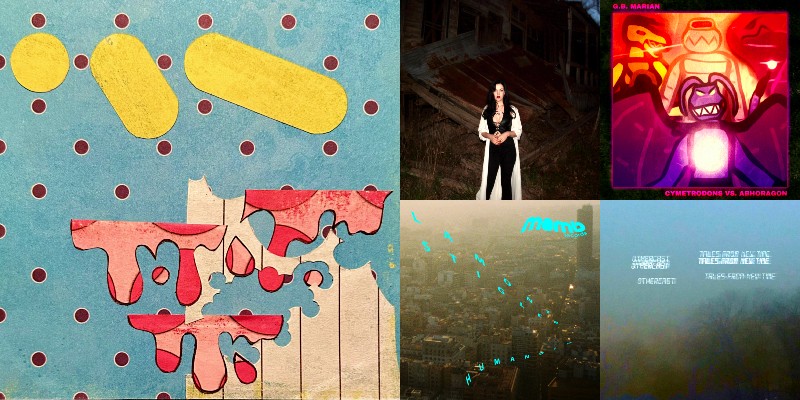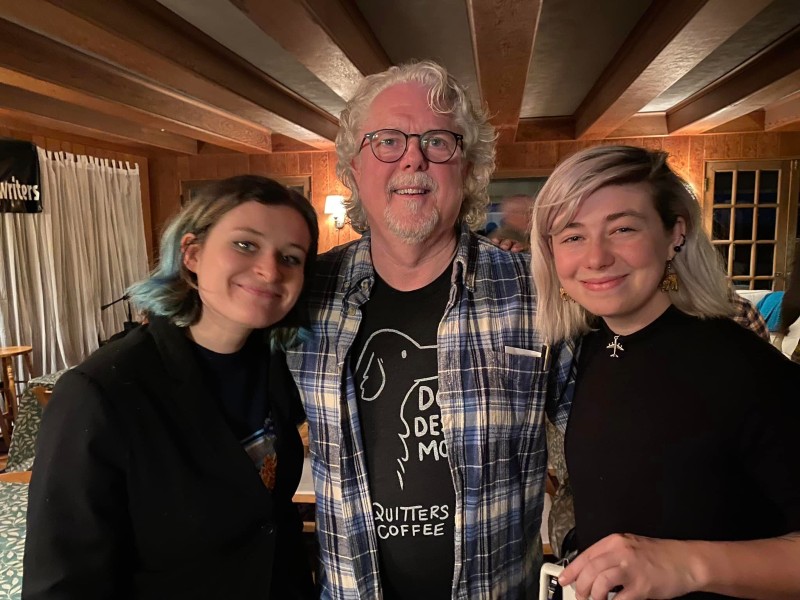Nick Shoulders & The Okay Crawdad Takes Country Music Back to Its Roots

Nick Shoulders doesn't think the stereotypical images of country music are sexy.
“We’re living in the same world as red scares, endless wars, pandemics, and bank failures that the origins of country music identified with,” said Shoulders, who's from Fayetteville, Arkansas. “The endless wars and the scary stuff that was forming early country music is far more of the reality I inhabit. That’s what I try to channel through in my craft. I’m not doing this because it's Civil War recreation stuff or because it’s mired in an experience that’s really far away. It’s still with us.”
After going viral during the pandemic with a performance of his track, “Snakes and Waterfalls,” Shoulders has become a beloved token of the best the country/Americana genre has to offer. Having now amassed over 3 million views, the video features Shoulders in his true nature: in the middle of the forest, singing (and yodeling) on a tree stump alongside his dog.
In 2019, Shoulders released his first full-length album Okay, Crawdad after his 2018 EP, Lonely Like Me. And last year, Shoulder released his fourth record, All Bad, a live-recorded, 14-track showcase of Shoulders at his best. The record was released via Gar Hole Records, the label Shoulders founded and co-owns, and is the first album released with his former band, The Okay Crawdad, since their pandemic hiatus.
Shoulders is a staple in the current “pseudo-new wave” of Americana/country music that’s been a dominant genre for years now. But with the help of platforms like TikTok, certain songs are lassoing in fans whose only prior exposure to country music might be to the sterile, strangely sexualized tunes that dominate the top charts. But with this success, Shoulders grapples with the cultural challenges the genre faces.
Friday Five: JTC, Evan Haywood, Tanager, Emma McDermott, Olivia Van Goor and Paul Keller

Friday Five highlights music by Washtenaw County-associated artists and labels.
This week features acid/techno by JTC, psychedelic funk by Evan Haywood, indie rock by Tanager, pop-folk by Emma McDermott, and jazz by Olivia Van Goor and Paul Keller.
U-M’s take on Anton Chekhov's "Cherry Orchard" balances an awkward blend of comedy and tragedy

Is it a tragedy or a comedy?
Anton Chekhov, master short story writer and playwright, believed he had written The Cherry Orchard as a comedy, taking a jab at a rapidly fading way of life in rural Russia. When director Constantin Stanislavski directed the play for the Moscow Art Theatre in 1904, he directed a tragedy about a social order soon to be eclipsed by a very different social order.
The University of Michigan’s Department of Theatre and Drama balances the two points of view with mixed results.
In his program notes director Daniel Cantor acknowledges the shifting tone that leaves room for very different points of view.
Cantor writes, “What’s fascinating to me about The Cherry Orchard is that it contains intense contradictions: contradictions in style, theme, and action, and highly contradictory characters. It fully occupies a tragicomic perspective that is always moving, shifting, turning on a dime—whipping from the profound to the farcical, the spiritual to the absurd. And sometimes both at once.”
Mary Gaitskill Reflects on Her Latest Works and Extensive Career During U-M's Zell Visiting Writers Series Event

According to writer and University of Michigan alumna Mary Gaitskill, almost nothing is unbelievable and people are weird. Her work often reflects this notion with morally ambiguous characters, a gritty detailing of misconduct, and a complete rejection of clean-cut, black-and-white narratives.
Quin, the protagonist of her acclaimed 2019 novella, This Is Pleasure, is one of her weirdest characters. In Quin's mind, his flirtatious workplace actions weren’t all that bad. When women began coming forward about feeling violated, he became caught off guard.
“There was a cultural landscape for a while at least where he existed—I’m not saying it would be acceptable to everybody,” Gaitskill explained about Quin. “I’m sure he did offend some people, but because of his position, I think he didn’t realize he was offending people.”
Gaitskill shared her latest works and extensive literary experience during a March 21 reading and Q&A at the University of Michigan Museum of Art’s Helmut Stern Auditorium. Hosted by the Zell Visiting Writers Series, an annual showcase sponsored by The Helen Zell Writers’ Program, it brings fiction writers and poets to U-M’s campus to host public readings and lectures.
Initially published in The New Yorker, This Is Pleasure dominated literary circles due to its unlikely telling of a story of the “#MeToo” movement, a social campaign aimed at exposing people, especially those in positions of authority, involved in sexual misconduct.
It offers a complex narrative about two characters, Quin and Margot, who find themselves entwined with the tendrils of a public sexual misconduct scandal. Quin—a husband, father, and New York book editor—loses his career once young women start coming forward about his wrongdoings. Margot is Quin’s former co-worker, and after rejecting his sexual advances early in their working relationship, the two became close friends in the industry. When Quin’s name hits the front pages of tabloids, the two navigate the complex intersections of power, guilt, and manipulation.
Susan Goethel Campbell’s “Garden Repairs” traverses the intersection of natural and man-made worlds

Not long before visiting Ferndale-based artist Susan Goethel Campbell’s Garden Repairs installation at the U-M’s Institute of the Humanities, I’d shared a photograph on social media of a cluster of snow-dusted daffodils in my backyard, shriveled and hunched over. I’d been struck by how often nature mirrors human gesture; how these flowers visibly conveyed what many of us were feeling that morning, as we pulled winter coats and gloves back out of our closets, just days after walking around in shorts. I’d wondered if the natural world shaped the way our physical bodies communicate emotion, or if this is all, in fact, subtle, visible evidence of our inter-relationship with each other.
As it happens, this train of thought was a perfect foundation for experiencing Campbell’s work, which marries the natural and man-made worlds in surprising ways.
John Sinclair, Renowned Detroit Counterculture Poet, Writer, and Activist, Dies at 82

Poet, writer, and activist John Sinclair has died at age 82.
According to the Metro Times, he died of heart failure this morning at Detroit Receiving Hospital and had been struggling with health problems in recent months.
Born in Flint in 1941, Sinclair was a highly regarded leader in Detroit’s counterculture scene of the 1960s and 1970s. Famous for his radical politics, Sinclair also managed the MC5 and co-founded the White Panther Party and the Ann Arbor Sun.
In 1969, he was sentenced to 10 years in prison after offering two joints to an undercover female narcotics officer.
Various public and private protests soon culminated in response to Sinclair’s sentencing, including John Lennon writing a song called “John Sinclair” and the launch of an annual marijuana legalization rally in Ann Arbor that would later become known as Hash Bash.
Theatre Nova's "the ripple, the wave that carried me home" explores how a family deals with a long fight for social justice

A social change agent who’s also a parent lives inside a paradox: Though they’re often driven by hopes of making the world a better place for their child, they must necessarily invest a vast amount of time and passion (that might otherwise be spent on the child) into their cause to even have a chance at moving the needle—and that child’s resentment can all-too-easily take root and grow.
This is one of the primary conflicts at the heart of Christina Anderson’s play the ripple, the wave that carried me home, now on stage at Theatre Nova. The 90-minute drama focuses on Janice (Bryana Hall), a woman living with her husband and sons in Ohio in 1992 as the L.A. riots—sparked by acquittals for the police officers who brutally beat Rodney King—unfold on television.
Friday Five: Laserbeams of Boredom, Othercast, Lamont Stigler, Dollie Rot, G.B. Marian

Friday Five highlights music by Washtenaw County-associated artists and labels.
This week features dubby jams by Laserbeams of Boredom, ambient by Othercast, electro-techno by Lamont Stigler, gothic-folk by Dollie Rot, and electronic soundtracks by G.B. Marian.
Little Victories: Jim Cherewick Finds Cathartic Moments in Everyday Life on "Good News" Album

Jim Cherewick admits he recently went through a breakup.
But it’s not the kind of breakup that immediately comes to mind.
“A lot of it is about leaving that terrible retail [job],” said Cherewick, who previously worked at a big-box store. “It was such a burden—it was sad and it was scary. Getting out of that was so important and needed.”
Cherewick addresses that professional split on “Frosting on Fire,” the melancholic opener from the Ypsilanti singer-songwriter/visual artist’s latest indie-country-folk album Good News.
Backed by somber acoustic guitar and keys, he sings, “Questions stick to my bones / Like how much longer do we get another try here? / Making every single day a treasure cause I’m awake / And I won’t complain, no I won’t complain / I work at one of those stores.”
“As much as I didn’t want to write about it, I did because I wrote it during [the pandemic],” Cherewick said. “The job sucked, and it was soul-crushing. It was so bad, and then they would cut hours, and then they’d be hiring new people.”
Despite that soul-crushing experience, Cherewick finds fleeting moments of catharsis and gratitude on Good News. The album’s eight tracks reflect on the harsh realities of everyday life and yearn for an escape from drudgery, disappointment, and uncertainty.
Breakneck Speed: Mark Jewett Follows Life's Hectic Pace on "Too Fast" Single Featuring The Accidentals

These days, Mark Jewett moves at warp speed.
The Plymouth singer-songwriter maintains a frantic daily pace on his latest single, “Too Fast.”
“It was more of a general feeling of being closed in and trapped and things just coming at me faster than I could deal with them,” said Jewett about the folk-pop track, which features a collaboration with Sav Madigan and Katie Larson of The Accidentals.
“One day, I just took a break at my desk, and I picked up my guitar. I started doing this chunking rhythm like you hear at the beginning of the song. I was drinking coffee, and I thought, ‘I need some energy,’ and the line just popped into my head.”
That initial opening lyric was “I’ve got a thousand watts of black coffee / Pumpin’ through my veins,” but Jewett upped the ante to “Two thousand watts of black coffee” instead.
“Kyle Rasche caught me between shows up at Nor-East’r last year when I was in the merch barn. He said, ‘Man, that’s a great line,’ and he thought I had said something about ‘8,000 watts,’ but it was originally, ‘I’ve got a thousand watts,’” said Jewett, a University of Michigan alumnus, who started writing the track last spring. “I thought maybe there was too much there, so starting it with 2,000 [watts] just punctuates it right at the beginning.”


































